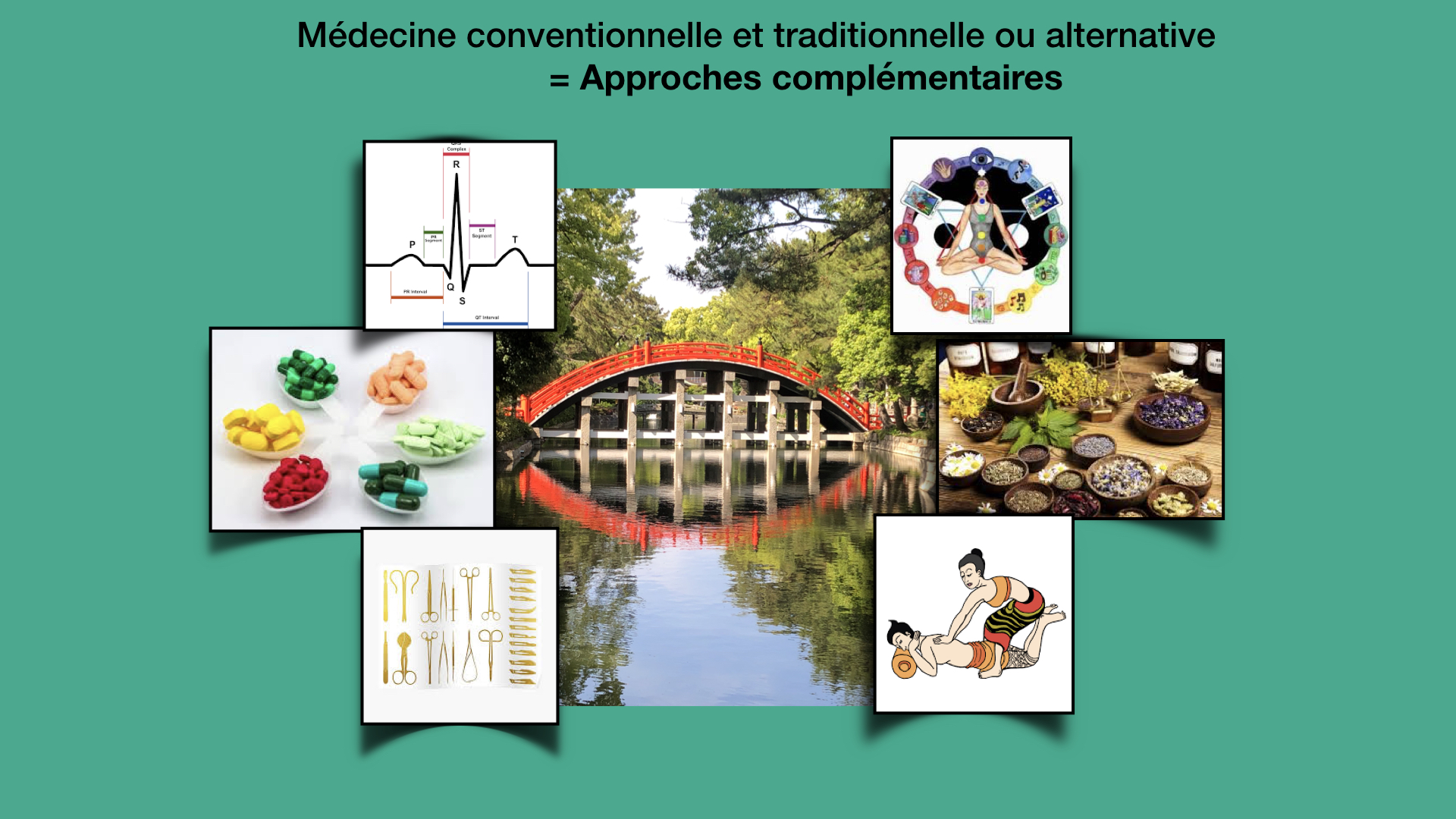INTEGRATIVE MEDICINE
INTEGRATIVE MEDICINE
Integrative medicine is “the simultaneous use of conventional medicine and one or more complementary and alternative medicines”. It has been developing since 2000 to meet a growing need and demand from patients. It also addresses the need for consistency and coordination between therapies for better efficiency and increased well-being.

The medicine practiced in the West, also called conventional or allopathic or official medicine, is indeed efficient and often highly specialized medicine. This high level of specialization has improved life expectancy and quality of life, it has made it possible to eradicate certain diseases and make others curable, mainly through drugs and surgery.
This medicine follows evidence-based rules, which means that a new treatment must have been rigorously and independently investigated before it is declared effective.
This has a financial cost first, but also a human one, with increasingly technical treatments, each specialist looking after one organ or one disease, reduced consultation time, numerous more or less invasive additional examinations, all this at the expense of comprehensive care. As a result, the treatment of the patient is increasingly fragmented.
Moreover, conventional medicine is often less focused on prevention and, in certain pathologies, in particular chronic diseases, it has shown its limits for many years.
Alternative or complementary medicine not only assesses the disease, but also the patient as a whole: his lifestyle, his somatic, emotional and environmental dimensions. They often emanate from traditional medicines and have a holistic approach, that is to say, they consider the patient as a whole entity.
According to the WHO: “Traditional medicine is the sum total of the knowledge, skill, and practices based on the theories, beliefs, and experiences indigenous to different cultures, whether explicable or not, used in the maintenance of health as well as in the prevention, diagnosis, improvement or treatment of physical and mental illness.”
They are often ancient medicines that are based on the observation of natural phenomena and human behavior, as well as their interactions. They do not use additional examinations, but simple and natural means for the body and mind to regain their balance: healthy lifestyle, diet, physical activity, plants, massages, acupuncture, yoga, meditation, etc. In addition, patient education and prevention are an integral part of their practice, the objective being to treat the patient as a whole, body and mind, as well as in his socio-family and environmental context so that he remains in good health, both physically, mentally and psychologically.
These 2 types of medicine, conventional and alternative, have long clashed, the practitioners of the former often dismissing the latter for charlatanism while refusing to make room to integrate the teaching of these medicines or techniques in universities, thus not allowing certified training, nor making controlled practice accessible to all patients.
This opposition is not only unnecessary, it can also be harmful. If conventional allopathic medicine is indeed essential when treating a large number of pathologies (traumas, cancers, infections, cardiovascular diseases, etc.), it is often less effective for other diseases, in particular chronic diseases (pain syndromes, functional syndromes, palliative care, mood disorder and side effects of diseases or conventional treatments) for which complementary medicines give good results and improve patients’ quality of life.
Patients are seldom and belatedly referred to these alternatives medicines or techniques by their family doctor, often only after failure of conventional treatments.
This in spite of the fact that numerous studies, carried out all over the world, have shown that in certain chronic conditions, up to 50% of patients resorted to alternative medicines, but only 20% informed their doctor. This can potentially lead to complications if there is incompatibility between 2 treatments, especially with herbal medicine or chinese pharmacopoeia, whereas a concerted approach limits medical overconsumption and allows efficient synergy.
However, in recent years, awareness has increased and, currently, there are 3 chairs of integrative medicine in Switzerland (Lausanne, Bern, Zürich) and many public or private centers. This acceptance was encouraged by the fact that in 2009 the Swiss people voted for alternative medicine to be taken into account and as a result, the Swiss constitution was amended accordingly.
5 alternative medicines are recognized by official institutions as effective and useful: traditional Chinese medicine TCM, anthroposophic medicine, homeopathy, neural therapy and herbal medicine
